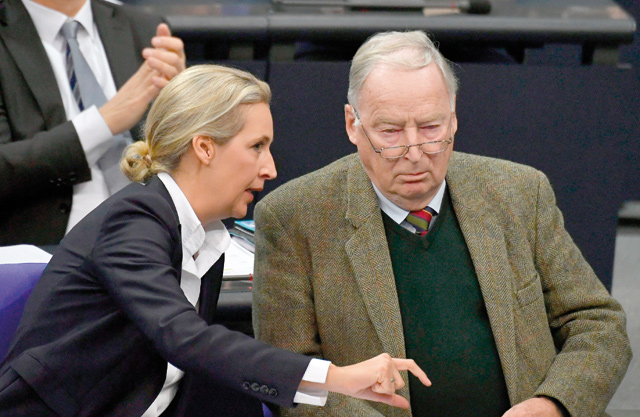BERLIN — Germany’s far right Alternative for Germany (AfD) Party is choosing new leaders on Saturday in a vote shaped by an increasingly powerful radical wing which wants a rethink of the country’s culture of atonement for Nazi crimes.
The anti-migrant party’s radicals have the upper hand following a series of electoral gains in eastern regions in September and October that have caused widespread domestic and international concern.
A few days ahead of the vote at the party conference, only one member of AfD has officially put forward their candidacy for the job.
Lawmaker Gottfried Curio, 59, is known for his strident anti-migrant speeches but does not have broad support in the party and is seen as having few chances.
The real drama will come on Saturday when candidates will pitch for the support of some 600 delegates at the conference in Brunswick in northwest Germany.
Of the party’s two current co-leaders, Joerg Meuthen is expected to seek a new mandate while Alexander Gauland has said he will only decide on the day depending on who else comes forward.
‘An anarchic clique’
The party, which was only established six years ago, is riven with personal and ideological rivalries and Gauland himself called it “an anarchic clique”.
Meuthen, a university professor from the wealthy Baden-Wurttemberg region in western Germany, represents the more moderate wing of the party.
The suspense is over who, if anyone, will replace the 78-year-old Gauland — a central figure in the party who is also co-leader of its MPs.
Gauland has until now managed to unite the AfD’s factions but the growing influence of one group — known simply as “The Wing” — is a challenge.
The group’s leading protagonist is Bjoern Hoecke, the AfD’s leader in the eastern region of Thuringia where the party came second in an election in October.
“The Wing” aims to radicalise the party by tackling one of the foundation stones of Germany’s post-war political culture — atonement for its Nazi past.
While accusations of links between some of the faction’s candidates and neo-Nazi groups have failed to frighten off voters, they have drawn the attention of the secret services to the party’s activities.
“The electoral successes of the pre-fascist wing in the eastern regions will accelerate radicalisation,” said Matthias Quent, a researcher specialising in the far-right, quoted by the Swiss daily Tagesanzeiger.
“More and more moderate AfD members are leaving the party,” he was quoted as saying.
Radicals an ‘integral part’
One name that different factions could get behind is that of Tino Chrupalla, a 44-year-old MP and former house painter who is expected to put himself forward.
“If I am asked, I will not shirk my responsibilities,” he recently told the Frankfurter Allgemeine Zeitung.
Chrupalla has said “The Wing” is an “integral part” of the AfD but has kept his distance from the radicals.
Whoever takes over faces a challenge in reviving the party’s popularity on a national level.
With 91 MPs, the AfD is now the third political force in the German parliament after the CDU and SPD.
But its support in opinion polls has stagnated at around 13 to 15 per cent.
The AfD started out as a eurosceptic party but became increasingly anti-migrant and opposed to Angela Merkel after the German chancellor welcomed around 1 million asylum-seekers in 2015 and 2016.
Mainstream parties have refused to work with the AfD and therefore prevented it from holding executive power on a national or regional level.
But anti-AfD campaigners are concerned and several protests are expected in Brunswick on Saturday.
Even the German car giant Volkswagen, whose name is on the hall where the conference will be taking place, has asked for its logo to be covered up during the debate.
